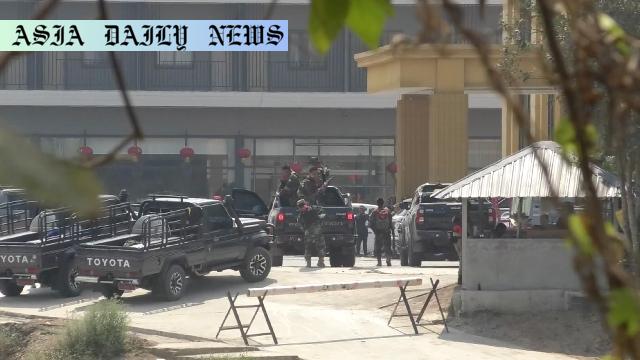Myanmar militia: The BGF freed about 3,000 foreigners from scam centers in Myanmar’s east, targeting illegal human trafficking hubs.
Myanmar militia BGF rescued 3,000 foreigners forced to work in scam hubs.
BGF targeted KK Park, a hub for trafficking and online fraud.
Workers were lured into Myanmar with false job offers.
Raids will continue to combat these criminal networks.

Myanmar Militia Rescues 3,000 Exploited Foreign Nationals
The Border Guard Force (BGF), an ethnic minority militia in Myanmar, has undertaken a highly significant and bold operation near the country’s eastern border with Thailand. Over the weekend, the armed group freed around 3,000 foreigners who had been forced to work under dire circumstances in scam centers. The rescue operation, specifically targeting KK Park—an infamous hub for human trafficking and online fraud—marks a pivotal step in the fight against criminal syndicates in the region.
KK Park: A Hotspot for Human Exploitation
KK Park is widely recognized as a major center of illegal activities, including human trafficking, scams, and other criminal operations, primarily run by Chinese syndicates. For years, these syndicates have used the site to deceive and exploit individuals from various countries. The victims were often enticed through online job postings that promised lucrative salaries. Instead, upon arrival, they were coerced into performing fraudulent online schemes and other illegal activities. This operation by the BGF highlights the deep-rooted challenges posed by these organized criminal networks.
A Diverse Group of Victims
The victims rescued by the BGF reportedly span 15 countries and regions worldwide. Although they included individuals from Asia, Europe, and beyond, there were no Japanese nationals among the rescued. Over 90 percent of the victims were misled by enticing advertisements and ended up trapped in KK Park’s shady operations. Myanmar has faced longstanding challenges in controlling illegal activities due to its complex border dynamics and institutional weaknesses.
BGF’s Ongoing Mission
The BGF reported that the operation is just one of a series of planned raids on criminal hubs in Myanmar. In addition to rescuing individuals, the raids aim to dismantle the entrenched networks of traffickers and scammers that have perpetuated economic and social exploitation. By acting against these entities, the BGF is taking concrete steps to safeguard human rights and uphold justice in the region.
Connecting Global Impact to Local Action
Such an audacious operation has far-reaching implications for Myanmar and the international community. As globalization intensifies, border areas like those between Myanmar and Thailand become critical points of both opportunity and exploitation. Criminal networks often exploit these vulnerabilities, creating a complex web of illegal activities that is difficult to unravel. It is noteworthy that this rescue mission not only addresses local concerns but symbolizes a move towards greater accountability and collaboration in addressing human trafficking.
Need for International Collaboration
This operation also serves as a reminder of the importance of cross-border cooperation. Considering that the victims hail from diverse parts of the globe, it becomes evident that human trafficking and exploitation are issues requiring a global response. Governments, NGOs, and international organizations must come together to create legal frameworks, share intelligence, and launch initiatives that deter such activities. In addition, efforts must be made to rehabilitate and support survivors of these atrocities.
Future Implications for Regional Security
The BGF’s success in Myanmar not only lends hope but also raises questions about regional stability and governance. Moving forward, it becomes imperative for local and international stakeholders to address the root causes that enable human trafficking networks to thrive. Ensuring transparency, strengthening border management, and offering viable economic opportunities for vulnerable populations are among the critical measures that must be taken.
Conclusion
The BGF’s recent operation is a noteworthy development in the global battle against human trafficking and online fraud. While much work remains to be done, the release of 3,000 foreigners is a testament to the potential of united action in combating organized crime. On a broader scope, this rescue underscores the need for a multi-pronged, collaborative approach to ensure justice and dignity for all individuals across the world.
Commentary
A Significant Humanitarian Victory
The Border Guard Force’s remarkable operation in Myanmar is not only a logistical triumph but also a much-needed humanitarian success. Freeing 3,000 individuals from forced labor is no small feat, especially when tackling entrenched crime syndicates that prey on the vulnerable. Their decisive action sends a powerful message about the importance of human rights and access to justice, even in challenging territories.
The Shadows of Global Exploitation
The story brings to the forefront the pervasive nature of human trafficking and exploitation in our modern world. It serves as a grim reminder of how desperation and false promises can entrap individuals into dangerous circumstances. Regions like Myanmar’s eastern border continue to remain critical flashpoints, where unscrupulous groups expand their influence. The fact that KK Park mainly targeted foreigners demonstrates the international dimension of these criminal networks.
Collaborative Actions Are the Way Forward
While this operation is undoubtedly a step in the right direction, it also pinpoints the urgent need for global partnerships. Countries and organizations must engage in intelligence sharing, joint operations, and preventative measures to combat such atrocities effectively. Equally critical is the safety and rehabilitation of those rescued, ensuring they can rebuild their lives without fear of re-exploitation.
Broader Implications
The success of Myanmar’s Border Guard Force exemplifies how a localized effort can have ripple effects on a global scale. It encourages hope for other regions tackling similar crises while urging continued vigilance. This story is not only a testament to resilience but also a call to action for global communities to stand against exploitation wherever it occurs.


